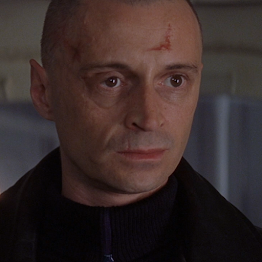The World is Not Enough
The Guardian posted an article this week, compiling readers' votes on who they considered to be the best Bond actor. I was slightly shocked with the results, from best to worst being Connery, Dalton, Brosnan, Moore, Craig, Lazenby. I've a lot to say about this list but worse was when I repeated my preference of the Bonds to a friend, I completely, unintentionally, forgot to list Brosnan. And this really sums up his third film as the superspy - The World is Not Enough, despite a bevy of interesting ideas is at best interesting, and seeds some ideas that would be used better in future films, but is mostly forgettable, and at worst downright outrageously bad.
The plot itself is the most interesting aspect of the film, with the longest pre-credit sequence of the series setting up a conspiracy to kill oil heiress Elektra King, after the assassination of her father in the opening. Potentially behind this plot to kill is terrorist, anarchist, Renard, with an underused villain gimmick of being unable to feel pain. Renard has history with Elektra, having previously kidnapped her, only to have her escape and now it appears he is back for revenge.
However, as with all the best plots, all is not what it seems, with it turning out to be the case of a reverse Stockholm Syndrome: during the kidnapping, King Snr. sought out everyone's favourite hardass commanding officer, M, for advice. She advised not paying the ransom, and to use Elektra as bait. Naturally, Elektra didn't take kindly to this, and managed to turn Renard to her side, and has now set up a plot to wipe out her father, M, and to secure her oil empire by nuking the Bosporus to ensure her pipeline is favoured.
So from this tangled and psychologically driven plotting you get some great things. Chief among them is a totally unique villain setup for the series. The film goes to great lengths to paint Elektra King as a Bond girl in the mould of Tracy from On Her Majesty's Secret Service: headstrong, adventurous, and not keen on following Bond's orders. The added benefit of having King be present for the majority of the film is that it allows her character to get an unusual amount of development over the course of the film. Of course, it is revealed that any sweetness and innocence that she may have exhibited in the early stages of the film was nothing more than a sham, but it is nevertheless a winning performance by Sophie Marceau. She also gets to play out a classic villain scene, involving tying Bond to an ancient torture chair, primed to snap his neck, whilst engaging in some sexually perverted dialogue ("Do you know what happens when a man is strangled?") Her death, shot in cold blood by Bond is another highlight of the series: she is banking on Bond's romantic heart taking over his itchy trigger finger, but her bluff fails, and a shaken M observes the aftermath of the killing.
Speaking of M, she is the other highlight of the film, getting thrust into the limelight more than in any other film. As a chief target of Elektra's wrath she is not relegated to a mere source of exposition, as is the traditional case for M but instead is right in amongst the action. Here, we get characterisation that would be furthered during Craig's tenure, but the cold blooded commanding officer is already present, with her morally grey choice regarding Elektra's kidnapping being the cornerstone of King's plan of revenge.
Another returning face to the series is Robbie Coltrane's Valentin Zukovsky, a character I barely touched upon in the Goldeneye review. Robbie Coltrane is charmingly rougeish as ever, and similar to M, rather than just play an expository role, he too gets made into an integral player of the plot. His sacrifice to Bond and weary wry smile hits all the right beats.
Unfortunately, on this island of more progressive and interesting elements, there is an ocean of rote and actively bad components. Opposite Elektra King in the villainous duo is Robert Carlyle's Renard. Carlyle us sufficiently grim and sinister looking (with his facial scarring and shaved head, coming off like if Blofeld developed a nasty crack habit). However, he pales in comparison to his mistress Elektra, and perhaps this is the point. Until King's reveal, we are lead to believe that he is the chief antagonist, and by having King's personality outshine Renard's it gives credence to their backstory that she is able to manipulate anyone, including a terrorist kidnapper. Additionally, his villain shtick of feeling no pain is not really pushed to its limit, only coming up on a few choice occasions, including a rote "I'm going to kill my henchman who has failed me...but oh not the one you were thinking" which makes zero sense. I do enjoy his role in the relatively low key finale on the nuclear submarine, and in another interesting wrinkle for his villainous arc, when Bond taunts him with Elektra's death. The only reason he is carrying out his nuclear suicide is out of his love for her (clearly manufactured by Elektra) and to see Bond taunt him on the futility of this is a sharp element in the script. 
What isn't sharp and instead hits like a nuclear blast is the Bond girl that strides in wearing hot pants at the mid point: nuclear physicist Dr Christmas Jones. Arguably the most outrageously bad Bond girl in the canon, Dr Jones steals any psychological credibility that the film was striving for, and is seemingly only named as such so Bond can get off a dirty one liner to close the film. Like most Bond girls, she has a skillset that Bond does not have: here nuclear physics, but bar one scene is it s barely touched upon and she instead just spouts nuclear exposition and gets her shirt wet in waterlogged finale. Worse still, her introduction is a sign to the audience that clearly King is must be evil, as no Bond film can continue on with two Bond girls on the side of good.
Brosnan is as ever unflappable in the role, getting to flex his action chops more in his interactions with M and King, particularly his scenes with the latter once her villainy is out in the open. He also gets a touching scene with Desmond Llewlyn in his final appearance as Q. Although not intended to be his final appearance in the film, his final scene sees him introducing a new "Q" to take over, "R," played by John Cleese. Llewelyn sadly died in a car accident shortly after the premiere of the film. His continual appearance as the ever put upon Q during this tenure in the series, is one of the most iconic cinematic tropes, a useful shorthand in action films, often repeated, never bettered.
At least with The World is Not Enough there is still some psychological depth to proceedings, and the more outlandish aspects are thin on the ground. Not so for Brosnan's swansong, which dialled things up to 11 and then some.




Comments
Post a Comment